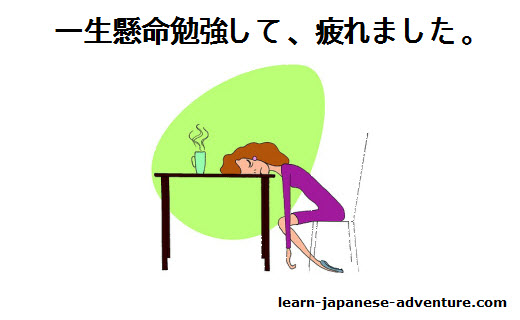- Home
- Intermediate Lessons
- te-form for Cause or Reason
te-form (て-form) for Cause or Reason -
Intermediate Lessons: 35
In this lesson, you are going to learn using te-form (て-form) of Verbs or Adjectives as the cause or reason that produces a consequence.

This is similar to the previous lesson, where Noun with the particle de (で) is used as the cause or reason.
Sentence Patterns
Let's first study the sentence patterns which use this grammar...
| Sentence 1 (Cause/Reason) | Sentence 2 (Result) |
| Verb (て-form) | Result |
| Verb (ない-form |
Result |
| い-adj (~ |
Result |
| な-adj で | Result |
| い-adj (~ |
Result |
| な-adj でなくて | Result |
1. Verbs or Adjectives to express feeling
2. Potential Verbs or Verbs to express state
In each sentence pattern, Sentence 1 presents a cause (or reason) and Sentence 2 presents the consequence produced by the cause.
Let's look at some examples...
|
1. |
天気が悪いから、富士山が見えません。 |
|
2. |
お金がないから、買えません。 |
The two examples above are grammatically correct. However, native Japanese don't speak in this way.
If the Result or Sentence 2 is a verb or an adjective that expresses feeling, or if it's a potential verb or a verb to express a state, then the cause or reason sentence will have to change to te-form (て-form).
Note that the verbs that express different states are verbs like ある (aru), いる (iru), なる (naru), etc.
This is just how native Japanese speak naturally, there's no particular reason why they speak in this way.
So since 見えません (miemasen) is kind of potential verb and 買えません (kaemasen) is a potential verb, the above two examples have to be changed to the following to sound more natural...
|
1. |
天気が悪くて、富士山が見えません。 |
|
2. |
お金がなくて、買えません。 |
Constraints of using te-form for Cause or Reason
Similar to the particle de (で) in the last lesson, this sentence pattern has many constraints or regulations over its usage.
As the cause or reason has to be changed to te-form (て-form), it leads to the first constraint for using this sentence pattern.
1. The words which come in the Result or Sentence 2 are limited to those words which do not contain volition or intention.
1.1 Verbs and Adjectives that express Feelings
I have included some commonly used verbs and adjectives that describe emotional feeling in the following two lists...
| Verb | Hiragana | Romaji | Meaning | |
| 1. | 困る | こまる | komaru | troubled |
| 2. | 怒る | おこる | okoru | get angry |
| 3. | 疲れる | つかれる | tsukareru | get tired |
| 4. | 驚く | おどろく | odoroku | surprised |
| 5. | びっくりする | びっくりする | bikkuri suru | surprised |
| 6. | 安心する | あんしんする | anshin suru | relief |
| 7. | 心配する | しんぱいする | shinpai suru | worried |
| Adjective | Hiragana | Romaji | Meaning | |
| 1. | 嬉しい | うれしい | ureshii | glad |
| 2. | 悲しい | かなしい | kanashii | sad |
| 3. | 寂しい | さびしい | sabishii | lonely |
| 4. | 楽しい | たのしい | tanoshii | enjoy |
| 5. | 恥ずかしい | はずかしい | hazukashii | embarrass |
| 6. | つまらない | つまらない | tsumaranai | boring |
| 7. | 複雑 | ふくざつ | fukuzatsu | complicated |
| 8. | 残念 | ざんねん | zannen | regret |
The below three examples are not Verbs nor Adjectives but they are also used to express emotional feeling.
| Hiragana | Romaji | Meaning | ||
| 1. | すみません | すみません | sumimasen | sorry |
| 2. | ごめんなさい | ごめんなさい | gomennasai | sorry |
| 3. | 有り難う | ありがとう | arigatou | Thank you |
Here are some examples that show how these verbs and adjectives can be used with te-form for a cause or reason...
|
1. |
ニュースを聞いて、びっくりしました。 |
|
2. |
恋人に会えなくて、寂しいです。 |
|
3. |
プレゼントをもらって、嬉しいです。 |
|
4. |
一生懸命勉強して、疲れました。 |
|
5. |
友達の怪我がよくなって、安心しました。 |
|
6. |
約束の時間に遅れて、すみません。 |
|
7. |
質問に答えられなくて、恥ずかしかったです。 |
1.2 Potential Verbs and Verbs that express States
Potential verbs can also be used to express states which do not contain volition or intention. Below are some examples...
|
1. |
月曜日は都合が悪くて、会議に出席できません。 |
|
2. |
話が複雑で、よく分かりませんでした。 |
|
3. |
眼鏡がなくて、小さい字が読めません。 |
|
4. |
明日の試験が心配で、寝られません。 |
|
5. |
毎日忙しくて、勉強する時間がありません。 |
1.3 Situations in the Past
Events that happened in the past can also be used in Sentence 2...
|
1. |
事故があって、電車が遅れてしまいました。 |
|
2. |
仕事に遅れて、上司に叱られました。 |
2. Expressions containing volition/intention (will, order, invitation, request, permission, prohibition, etc) are not used in Sentence 2. When it contains volition/intention, the phrase with te-form (て-form) cannot be used and instead the phrase with から (kara) is used.
|
1. |
危なくて、機械に触らないでください。 X |
|
2. |
危ないから、機械に触らないでください。 O |
te-form kudasai (て-form ください) is a request which contains intention and thus you cannot use this sentence pattern here. Therefore, example 1 above is incorrect.
3. In this sentence pattern, Sentence 1 and Sentence 2 are sequential events. In other words, Sentence 1 takes place first and Sentence 2 takes place after that.
|
1. |
明日試験があって、今日準備しなければなりません。 X |
|
2. |
明日試験があるから、今日準備しなければなりません。 O |
Since preparing for test happens before the actual test tomorrow, they are not sequential events. Therefore, you cannot use te-form (て-form) but have to use から (kara) here instead.
Related Pages
Lesson 20: Japanese Grammar for Cause and Reason.
Lesson 34: Japanese particle de for Cause or Reason.
Take The Challenge Sales! Get 45% OFF Premium & Premium PLUS! Ends on 16 Jan 2026
Click Here to Get 45% OFF Premium & Premium PLUS and be on the fast track to fluency in Japanese.
The link above is an affiliate link, which means that I would earn a commission (at no extra cost to you) if you do end up purchasing the related learning course.
Buy me a coffee









Facebook Comments
Don’t see the comments box? Log in to your Facebook account, give Facebook consent, then return to this page and refresh it.